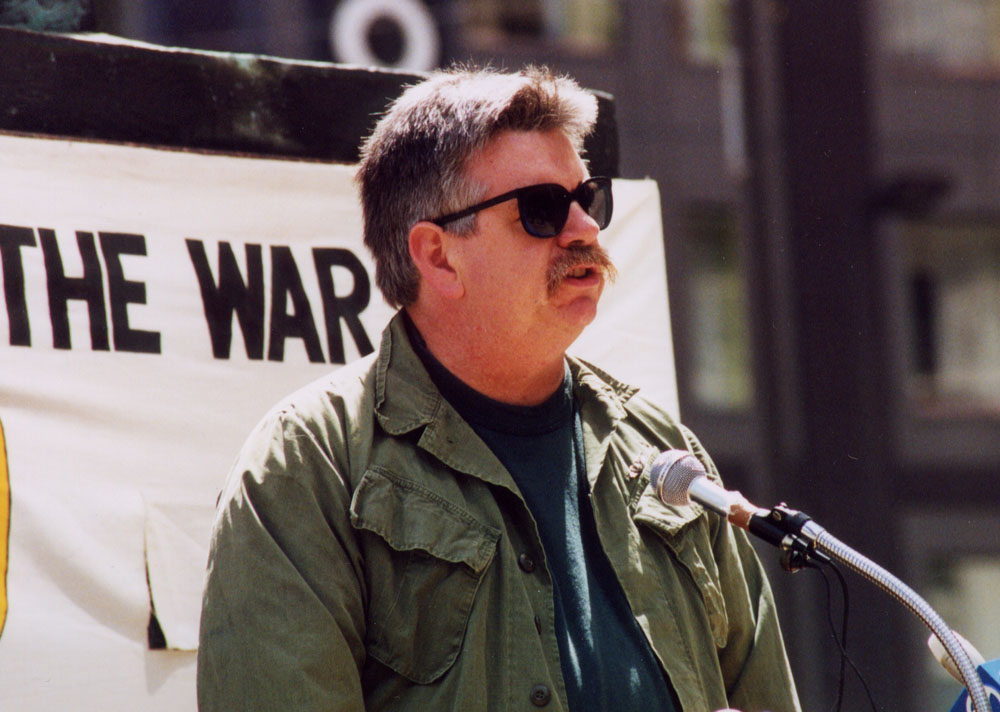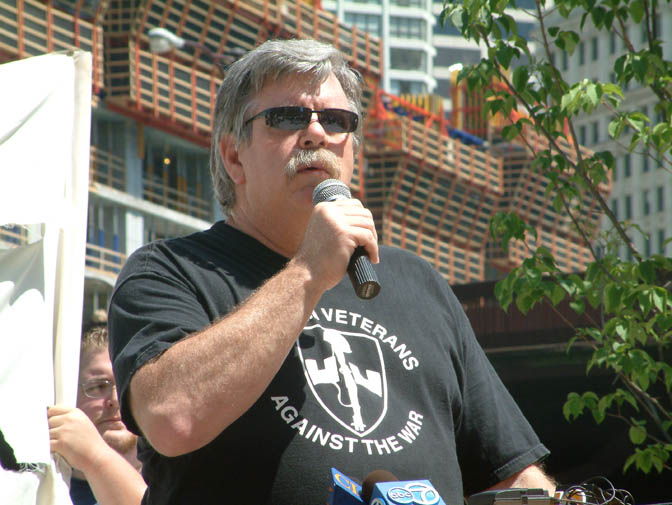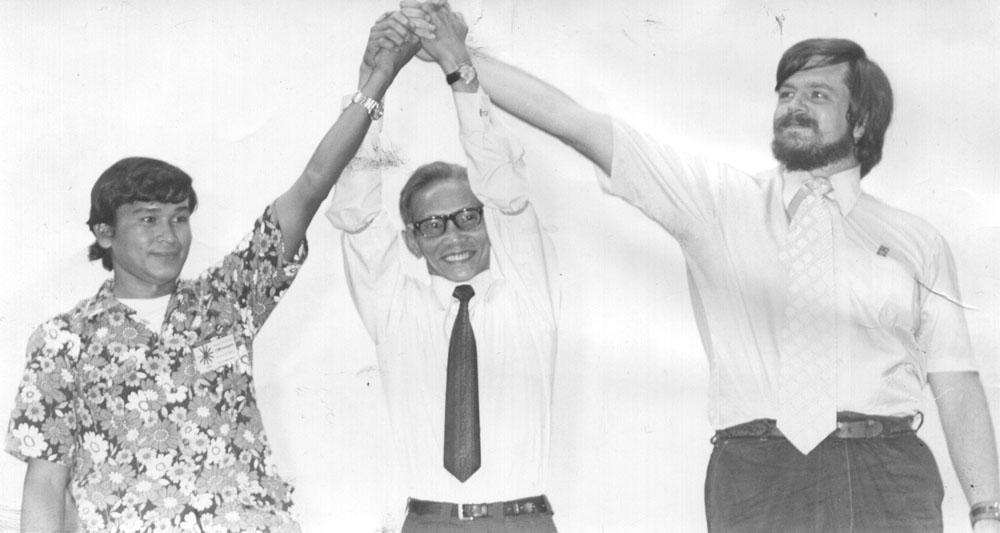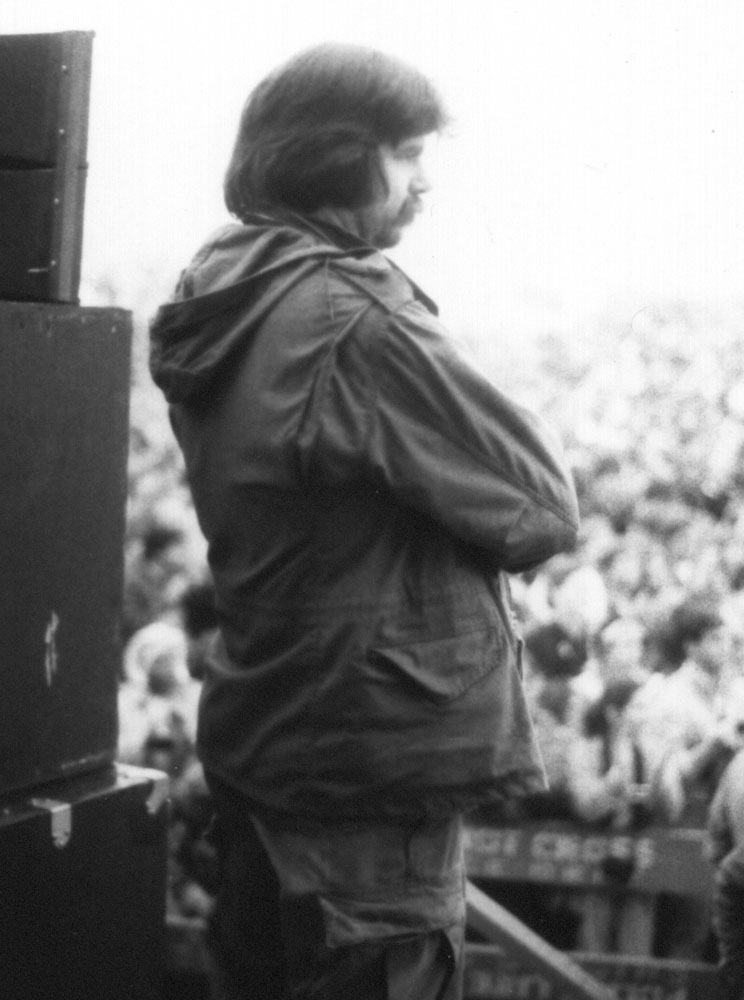 Download PDF of this full issue: v37n2.pdf (26.8 MB) Download PDF of this full issue: v37n2.pdf (26.8 MB) |
Bill Davis: 1948-2007
By Richard Stacewicz
[Printer-Friendly Version]

|
|
Bill Davis, Memorial Day 2000
|
Bill Davis died on September 5, 2007. I first met Bill on October 12th, 1992 to conduct an interview for an oral history of the VVAW. I was struck by his physical presence and disarming grin, which put me immediately at ease. He then went on to tell me the story of his life and in the process revealed a great deal about not only his life, but also that of VVAW. Bill epitomized VVAW.
Bill Davis was born in 1948 and lived with his maternal grandparents for most of his life prior to his tour-of-duty in Vietnam. Like many young men of his generation, he joined the Air Force as a draft-induced enlistee in 1966. He served at Vung Tau Airfield as a mechanic and part-time football player in 1968 and 1969 and was then stationed in Thailand with the Automated Battlefield Project and was discharged from active duty in 1970. Like most VVAW members, Bill began to feel uneasy about what he was seeing while in Vietnam and he embarked on the journey to make sense of his experiences that would lead him to take on the role of the Winter Soldier.
Shortly after he returned to the states and moved to Columbus, Ohio, Bill enlisted in the VVAW and began working with the GI Press. Like many of his brothers who joined VVAW, he had returned, "Filled with pent-up rage and anger and frustration." He translated these feelings into a lifetime of activism for social justice and against imperialism and war. Bill's approach to activism is summed up best in his own words, which relate a very early experience in the anti-war movement, "We were denied entrance in the Fourth of July Parade in Arlington, Ohio which was one of these whoop-dee-doo suburbs (of Columbus) ... we were always denied access to the parade. They were saying 'these guys are radicals. They're going to disrupt the parade.' We said, no just let us in and we won't disrupt it. They wouldn't let us in so we really disrupted it. We kept on disrupting every year until they finally said, 'Jesus, let these guys in the parade.'"
Bill sought to disrupt the war with eloquent and reasoned argumentation, free of jargon that resonated deeply with all who heard him speak. His sincerity and commitment to ending war and fighting for veteran's rights was evident to anyone who knew him. He was also unwilling to countenance bullshit and was willing to confront injustice and hypocrisy head on when necessary. His charm and wit softened his deeply held convictions and disarmed his adversaries. He was truly a leader; an "organic" intellectual (in the Gramscian sense) whose sharp critique of US foreign policy grew out of experience, discussion, and practice.
Bill's service in VVAW spans almost the life of the organization. He was involved in all of the critical historical markers, which define the organization and its legacy. While in Columbus, he worked tirelessly to build VVAW, organized active-duty GIs, worked with returning veterans to receive discharge upgrades and to heal from the traumas of war through the formation rap groups. He took an active role in the sit-ins at the VA to seek proper care for vets and he played a key role in bringing the effects of Agent Orange to light. Bill represented VVAW on trips to Japan and Nicaragua and marched on Washington again, and again, and again.
Since 1974, and after moving to Chicago with the new headquarters, Bill and a handful of his comrades worked to keep VVAW alive and active despite the internecine struggles and the exodus from VVAW that followed the end of the war in Vietnam. He helped to keep VVAW alive by staying true to his convictions and by carrying on the work of teaching, speaking and opposing America's ongoing conflicts. He has spoken to countless numbers of people in schools, at anti-war rallies and in numerous other venues. He was able to remain politically active while raising a family with Joan, coaching in the Shetland League of Oak Park Youth Baseball, and working for the UPS and acting as chief steward for local 710 of the International Association of Machinists and Aerospace workers. Bill last spoke at the VVAW's 40th Anniversary celebration in Chicago where he once again displayed his unique and powerful gifts to move a crowd despite his weakened lungs. Bill was truly a remarkable human being.
Bill Davis served his nation with great honor and dignity during his 37 years as an anti-war and labor activist, community leader, baseball coach and devoted father and husband. With his death, a big hole has been dug into the heart of VVAW. Yet that hole is being filled by a new generation of activists who have been moved to action by the words and deeds of Bill and countless other VVAW members. That is the legacy that he leaves us and that we must continue to build on because we are still at war and lives are still being taken. It is up to those of us who remain to fill the void left in Bill's wake. It's a big hole, but we have to try to fill it to honor Bill Davis and all of the other brothers and sisters of the VVAW who have died. It is our turn to help the new generation of veterans to carry on with the work of ending war.
Peace Bill.
Richard Stacewicz is a Ph.D. in history, author of Winter Soldiers,
and Professor of History and Social Science at Oakton Community College in Illinois.

|
|
Bill Davis, Memorial Day 2006
|

|
21st World Conference Against A&H Bombs, August 1-10, 1975 in Tokyo, Hiroshima and Nagasaki (l-r) Dino Jones from
Marianas Future Organization, Dang Quang Minh member of the Central Comm. of the NLF - Vietnam, Bill Davis of VVAW
|
|






